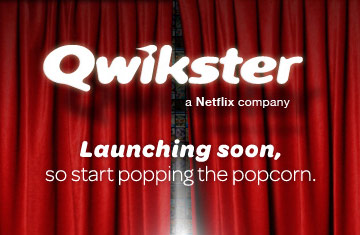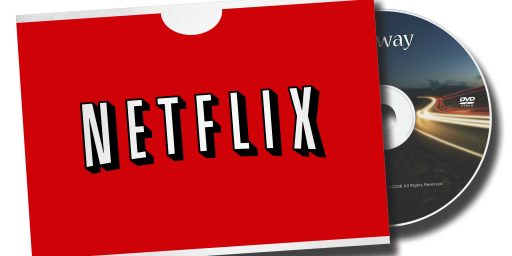Netflix Gets Out of DVD Business, Spins of Qwikster
In a truly bizarre move, Netflix is spinning off the DVD-by-mail business that built them into an international brand and going stream-only. Those wishing to keep getting movies will have to sign on to something called Qwikster.
In a truly bizarre move, Netflix is spinning off the DVD-by-mail business that built them into an international brand and going stream-only. Those wishing to keep getting movies will have to sign on to something called Qwikster.
Atlantic Wire‘s Adam Clark Estes (“Netflix Is Killing Their DVD Business to Save Their Company“) thinks this is a smart strategy.
Netflix is dividing in order to conquer. Sunday night, the company’s co-founder and CEO Reed Hastings announced in a blog post that they would be splitting up their DVD-by-mail and streaming services into separate businesses. Netflix will live on as a streaming-only service, and in a few weeks, the DVD service will become Qwikster, a name that Hastings says “refers to quick delivery” and that tweeting tech types are having a blast making fun of.
Estes’ Atlantic colleague Alexis Madrigal (“Hastings’s Hasty Move: Netflix Splits in Two, Renames DVD Business“) calls this a “hasty move.”
Leaving aside whether it’s wise to guide a company based on a hunch about history, there are a couple of indications that Netflix might be moving too fast. Number one is that they didn’t secure the Twitter handle @Qwikster or the homophone domain Quickster.com. Based on his tweets, @Qwikster is a young male who likes to smoke pot more than he likes to tweet. Quickster is owned by a domain name squatter advertising various types of flooring.
I have to wonder if Hastings started to panic as Netflix stock nosedived last week. After peaking at over $300 during the summer, Netflix’s share price is down to $155. It has lost almost a quarter of its value in just the past week of trading.
TechCrunch’s Erick Schonfeld (“Breaking: Netflix Splits DVD And Streaming Businesses; Creates Qwikster For DVDs“) thinks it makes long-term sense:
Customers can still subscribe to both, but the two sites will not be integrated anymore. Qwikster will also now offer video game rentals through the mail, a long-requested service. With this move, Hastings is reaffirming his long-held belief that streaming is the future of Netflix and the future of entertainment, and Wall Street can judge its progress by how well the streaming business is doing on its own. Separating the businesses will also force customers to make a choice, and it is obvious which choice Hastings wants them to make (hint: it starts with an “N”). Earlier today, I wrote a post beseeching Hastings not to listen to Wall Street after his stock got hammered. You’ve got to give him credit for moving fast in the direction where he thinks the greatest opportunity lies.
GigaOM’s Ryan Lawler (“Netflix’s DVD business: Does Qwikster have a future?“) argues the move will kill the DVD business.
But what happens when you create a separate website, with separate queue management and a separate billing mechanism? If you’re Netflix, you lose the power of the existing customer relationship and much of the goodwill that you’ve built up over the last several years. Regardless of the miscues in handling the price change and the separation of the DVD business, the Netflix brand still carries tremendous value to a number of existing and potential new subscribers.
You also lose the power of the bundle. One reason cable companies have been aggressively pushing triple-play packages over the last several years is that users who subscribe to two or more services are much less likely to quit. By separating DVD-by-mail and streaming businesses into separate billing relationships with subscribers, Netflix is exposing both to potentially higher churn.
Dan Frommer (“Netflix wants to get rid of its DVD business so badly that it’s changing the name… to Qwikster“) believes, “the future of Netflix is streaming videos. Period. Not mailing them to your house via the U.S. Postal Service, but delivering them to your TV and devices over the Internet.”
That’s almost certainly right. But even if this makes sense in the long term, it’s just bizarre right now. My wife and I have been longtime Netflix subscribers and used their streaming capability for years via our Roku box until the recent price hike. We’d be perfectly happy to stream all our movies and quit sending discs back and forth. There is just one small problem: There’s hardly anything available via streaming!
Frommer seems to think that Netflix will somehow force the studios to change that: “Netflix first has to convince Hollywood to stream its best movies, and it needs to train consumers to stream movies as a default behavior. That means making sure that the streaming business can stand on its own.”
But wouldn’t it make sense to first get movies for streaming, then train customers (via preferential pricing) to stream them, and then get rid of the DVD business? Skipping the first step is a recipe for frustration.





It is bizarre, but everything that Netflix has done recently is partly a reflection of Hollywood’s bizarre licensing rules and the hardline that the studios have been taking in negotiations over licensing for online streaming. That’s the main reason that there isn’t more available online – it isn’t Netflix’s fault so much as it is studios not wanting to hurt the still-lucrative home video market.
Obviously, streaming is the future, but this time the studios seem intent on asserting more control over things than they have since the whole home video market came into existence
I agree that streaming makes much more sense in terms of efficiency–even if it’s yet another nail in the Postal Service coffin. But we ain’t there yet.
FWIW, I stopped for my $1 DVD at RedBox yesterday, and they said “would you like another for 50 cents?” Maybe this is the option for the guy with time on his hands … but nobody is going to beat those prices.
(Unrated “Your Highness” is pretty dirty. I’m shocked that Natalie and Zooey would be part of it.)
Perhaps folks like me have gone to RedBox, hastening the NetFlix move to streaming.
That definitely seems to be the case. Both Netflix and Redbox would be much better services if the studios weren’t intent on hamstringing them.
I also think the possibility of massive changes with the USPS is also affecting the prospects for a DVD-by-mail based-business. It’s just cheaper and more efficient to deliver this content digitally these days.
(My library has Blu-Rays for $1, but that is an unusually awesome library.)
@Herb:
I don’t even object to the studios hamstringing Netflix and Redbox. They exist in a fairly narrow market niche and the studios are narrowing it ever farther.
What I object to is that the studios aren’t providing the service themselves. Why aren’t they eliminating the middlemen? I think it’s a question of how they identify their core competency and that’s hurting the studios, the middlemen, and consumers.
@Dave Schuler:
I believe I remember reading Sherman Anti-Trust Act cases from the mid-20th Century that severely limited the ability of movie studios to control the distribution stream to that extent. When the home video market first developed, many of the people who were around when those cartels were broken up were still in charge in Hollywood. It’s probable that their memory of the last attempt to control the distribution stream affected their decision making.
Good question.
The answer I’d offer is that until recently, they were the middlemen, at least in the video rental market. Blockbuster was, before being scooped up by Dish, a Viacom company. That’s why, back in the day, you could pre-order Forest Gump and get a Bubba Gump Shrimping Company cap exclusively at Blockbuster.
Plus, movie studios that are geared toward the production and marketing of films may not have the infrastructure to digitally distribute them. Yet…. Even then, I suspect that studios will find it easier to use a middleman than handling the technical aspects of digital distribution themselves. (The company I work for is elbow-deep in the digital distribution of films. It’s a different business than film production. We don’t have much use for gaffers, but network engineers are useful.)
Once they scale up, I suspect we’ll see more direct offerings, and not just the non-commercial indie stuff from Mark Cuban.
The DVD sales (and therefore rental) business will hang on until broadband pervasive in all market segments (including those below poverty line). That seems a long ways off.
The problems that Netflix showed when they began operations in Brazil shows that their problems are deeper than that, and that there are deeper managerial issues there.
@Dave Schuler:
Marketing Myopia
@john personna: And mine has them for the same free loans as other DVDs. They just limit the number than can be taken out at one time.
Until their streaming catalog catches up to their DVD catalog the streaming service alone just doesn’t seem worth it. Add on top of that the fact that if we want to keep both I’ll be forced to deal with two separate web sites, 2 separate, 2 separate accounts, 2 separate charges, it’s just worth it anymore in my opinion.
I love being able to stream to my TV and I think the DVD market is going to go the way of the 8 track before too long-although I think broadband will likely need to be more readily available before it happens.
I canceled my account recently due to the separation of streaming and DVDs in the mail. I kept the streaming option till recently because I thought surely the lack of streaming choices would be fixed sometime soon. Right now you cannot even stream stuff that you could stream before like B5…
@John Burgess:
That’s pretty cool. Older things are free 7 day loan, but the newest are $1 for me. A pretty good tradeoff.
Not impressed with Hastings’ mea culpa today. Dude, it’s not about you, it’s about your product offering. A short while ago you had a single strong offering at a reasonable price. Now you have two weak products. The streaming catalog is anemic, and DVDs are a legacy system. Offering both in a bundle was a nice bridge.
Not sure if Netflix will bounce back from this, and with this series of bonehead moves, not sure I care. As a customer, the lack of a good mechanism for offering feedback to the company tells you a lot about what they think of you.
The name change is weird. They have a brand name and they should stick with it. They could call it Netflix-mail and Netflix-streaming. But then again, I am not the CEO.
Qwickster’s a ridiculous name for the new Netflix dvd-by-mail split. Sounds like a kid thought of it. In the 80’s. A kid that embarrasses his friends by ending things with “-ster” and “-oni”.
Especially since dvd-by-mail is actually Slower to retrieve than instant-watch. Should have called it “Snailster, dvd-by-snail-mail.”
Seriously. I vote for Snailster.